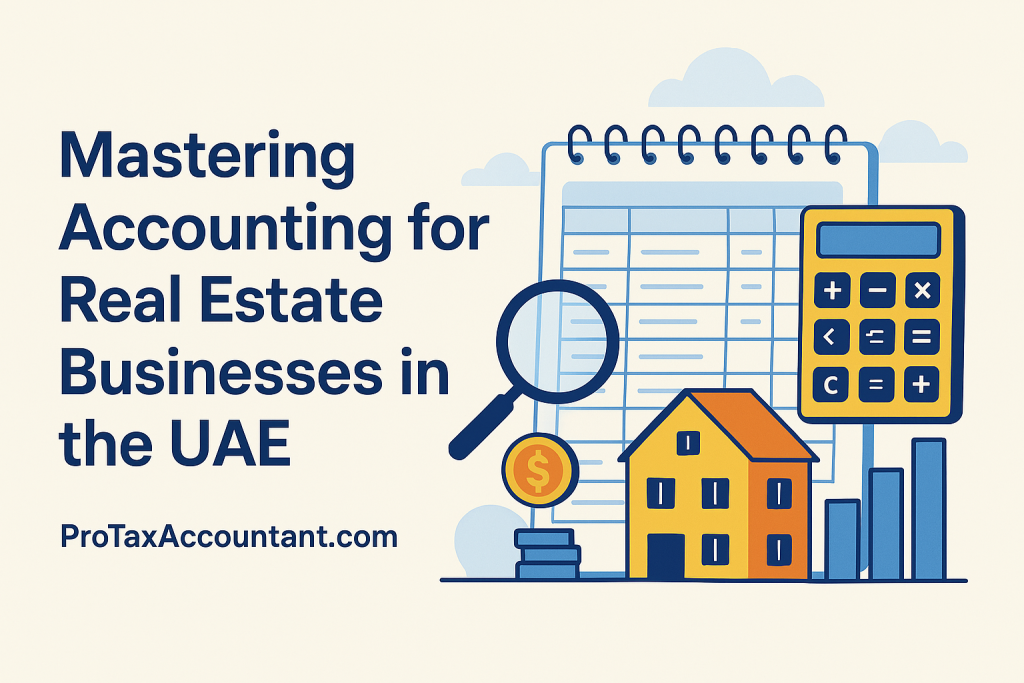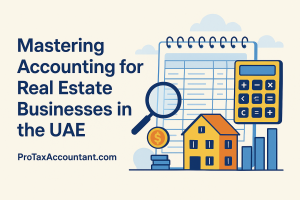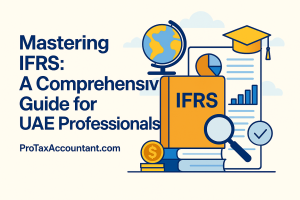Navigating the financial landscape of the UAE's vibrant real estate sector requires a robust understanding of accounting principles and regulatory compliance. Whether you're a seasoned developer, a property management firm, or a new real estate agency, establishing sound accounting practices is crucial for sustainable growth and avoiding penalties.
This comprehensive guide from Pro Tax Accountant dives deep into the essential accounting best practices for real estate businesses operating in the UAE, ensuring you're well-equipped to manage your finances with precision and confidence.
1. Business Setup & Legal Requirements
Establishing your real estate business in the UAE involves critical decisions regarding legal structure and adherence to specific regulatory frameworks. Your choice impacts everything from liability to tax obligations. For a more comprehensive guide on setting up your business, explore our Ultimate Business Setup Guide in Dubai.
Licensing and Legal Structure Options:
- Mainland Company: Registered with the Department of Economic Development (DED) in respective emirates. Offers flexibility to operate across the UAE. Structures include Sole Establishment, LLC, and Public Joint Stock Company. Learn more about choosing the right business structure in Dubai.
- Free Zone Company: Established within designated Free Zones (e.g., DMCC, JAFZA). Offers 100% foreign ownership, tax incentives, and simplified regulations, but operations are typically limited to within the Free Zone or internationally. Discover the best free zones in the UAE for business setup.
- Offshore Company: Used for holding assets outside the UAE (e.g., JAFZA Offshore). Offers privacy and tax efficiency for international investments, but cannot conduct business within the UAE.
If you're a foreigner looking to establish a presence, our guide on starting a business in Dubai as a foreigner can provide further insights. For specific opportunities, check out the top 20 business opportunities in Dubai.
Regulatory Authorities Involved:
- Department of Economic Development (DED): For mainland company registration and licensing in Dubai.
- Dubai Land Department (DLD): The primary government entity regulating the real estate sector in Dubai, including property registration and transactions.
- Real Estate Regulatory Agency (RERA): An arm of DLD, responsible for regulating real estate activities, licensing brokers, and overseeing escrow accounts for off-plan projects.
- Abu Dhabi Department of Economic Development (ADDED): Equivalent to DED for Abu Dhabi mainland companies. For setting up in ADGM, refer to our guide on establishing a business in Abu Dhabi Global Market (ADGM).
- Other Emirates: Similar authorities exist in other emirates (e.g., Department of Municipalities and Transport (DMT) in Abu Dhabi for real estate regulation).
The business registration process typically involves: 1) Determining your business activity and legal structure; 2) Reserving a trade name; 3) Applying for initial approval from DED/Free Zone Authority; 4) Preparing MOA/AOA; 5) Obtaining necessary external approvals (e.g., DLD/RERA for real estate); 6) Paying fees and obtaining your trade license.
2. Compliance & Financial Reporting
Accurate and timely financial reporting is the backbone of transparency and compliance in the UAE real estate sector. Adhering to International Financial Reporting Standards (IFRS) is mandatory. For a deep dive into IFRS, read our comprehensive guide to mastering IFRS.
Mandatory Financial Statements and Timelines:
Businesses in the UAE are generally required to prepare the following financial statements annually:
- Statement of Financial Position (Balance Sheet): A snapshot of assets, liabilities, and equity at a specific point in time. Learn how to analyze a balance sheet in under 2 minutes.
- Statement of Profit or Loss and Other Comprehensive Income (Income Statement): Shows revenues and expenses over a period, resulting in net profit or loss. Understand how to evaluate an income statement.
- Statement of Cash Flows: Details cash inflows and outflows from operating, investing, and financing activities.
- Statement of Changes in Equity: Explains changes in the company's equity over a period.
Timelines: Financial statements are typically prepared annually, often aligning with the calendar year, and must be ready for audit within a few months of the year-end (e.g., 3-4 months post-year-end for most entities). For insights into what makes ideal financial statements as per Warren Buffet, check out our article.
Sample Financial Reporting Calendar:
| Activity | Frequency | Key Deadlines (Example) |
|---|---|---|
| Bank Reconciliation | Monthly | 5th of next month |
| Payroll Processing | Monthly | Last working day of month |
| Management Accounts (P&L, BS) | Monthly | 10th-15th of next month |
| VAT Return Filing & Payment | Quarterly | 28th day after quarter end |
| Financial Statements Preparation | Annually | Within 3 months of year-end |
| External Audit Completion | Annually | Within 4 months of year-end |
| Corporate Tax Return Filing & Payment | Annually | 9 months after financial year-end |
Applicable Accounting Standards:
The UAE mandates the use of **International Financial Reporting Standards (IFRS)** for financial reporting. This ensures global comparability and transparency. Specifically, IFRS 15 (Revenue from Contracts with Customers) and IFRS 16 (Leases) are highly relevant for real estate businesses. Note that the UAE follows the accrual basis of accounting as per IFRS.
Audit-Readiness Checklist:
Click to expand: Essential Audit-Readiness Checklist
- ✅ Ensure all bank accounts are reconciled up to the year-end.
- ✅ Verify all accounts receivable and payable balances with third-party confirmations.
- ✅ Reconcile intercompany balances if applicable.
- ✅ Prepare a detailed fixed asset register with calculated depreciation.
- ✅ Review and reconcile all revenue streams, especially deferred revenue from advance payments.
- ✅ Ensure all expenses are properly accrued and matched to the correct period. For a deeper understanding, read about month-end closing procedures.
- ✅ Reconcile VAT accounts and ensure all VAT returns are filed and paid on time.
- ✅ Prepare a clear audit trail for all significant transactions.
- ✅ Organize all supporting documents (invoices, contracts, bank statements) digitally.
3. VAT Requirements for Real Estate
Value Added Tax (VAT) was introduced in the UAE in 2018. Its application to real estate transactions can be complex, requiring careful attention to detail. For comprehensive guidance, consider consulting a VAT consultant in Dubai.
Thresholds for VAT Registration:
- Mandatory Registration: If your taxable supplies and imports exceed AED 375,000 in the past 12 months, or are expected to exceed this in the next 30 days.
- Voluntary Registration: If your taxable supplies and imports exceed AED 187,500.
For more details on the registration process, refer to our guide on VAT registration in UAE. You can also explore the Federal Tax Authority (FTA) website for official information.
VAT Rules for Commercial vs. Residential Property Sales/Leases:
- Commercial Property (Sales & Leases): Generally subject to 5% standard-rated VAT. This includes offices, shops, warehouses, and other non-residential properties.
- Residential Property (Sales & Leases):
- First Sale/Lease of New Residential Property: Zero-rated (0% VAT) within 3 years of its completion. This means you can recover input VAT.
- Subsequent Sales/Leases of Residential Property: Exempt from VAT. You cannot charge VAT, nor can you recover input VAT related to these supplies.
- Bare Land: Exempt from VAT.
VAT Invoicing, Filing Periods, and Recordkeeping:
- Tax Invoices: Must be issued for all standard-rated supplies, containing specific information as per FTA regulations. You can use our UAE Tax Invoice Generator or refer to the tax invoice format in the UAE for details.
- Filing Periods: Typically quarterly, but can be monthly for larger businesses. VAT returns must be filed and paid within 28 days of the end of the tax period. Learn how to make VAT payment in UAE and about filing VAT returns in UAE.
- Recordkeeping: Maintain all tax records, invoices, and accounting books for a minimum of 5 years. For more on this, consider our guide on e-invoicing and VAT in the UAE.
Sample VAT Invoice Format (Simplified):
| TAX INVOICE | |
|---|---|
| Supplier Name: | Pro Property Management LLC |
| TRN: | 100xxxxxxxxxxxx |
| Address: | Office 101, Business Bay, Dubai, UAE |
| Invoice No.: | INV-2024-001 |
| Invoice Date: | 2024-07-30 |
| Customer Name: | Client A |
| Customer TRN (if applicable): | |
| Description | Amount (AED) |
| Commercial Property Rent (Aug 2024) | 10,000.00 |
| Service Charge | 500.00 |
| Subtotal | 10,500.00 |
| VAT (5%) | 525.00 |
| Total Amount Due | 11,025.00 |
For detailed guidance on VAT invoicing, refer to the FTA VAT Guides. If you're considering VAT deregistration, understand the VAT deregistration thresholds and process in UAE.
4. Corporate Taxation
The UAE introduced Federal Corporate Tax (CT) from June 1, 2023. Real estate businesses need to understand its implications for their income and property transactions. For a broader understanding of UAE Corporate Tax, visit our UAE Corporate Tax blog.
Applicability, Exemptions, Rates, and Reporting Structure:
- Applicability: Generally, all business income, including rental income from commercial properties and profits from property sales, is subject to Corporate Tax. This applies to both resident and non-resident persons. Find out who is considered a resident person for UAE Corporate Tax purposes and if natural persons will be subject to UAE Corporate Tax.
- Tax Rates:
- 0% for taxable income up to AED 375,000.
- 9% for taxable income exceeding AED 375,000.
- Exemptions: Certain exemptions may apply, for instance, income derived by a qualifying Free Zone Person from qualifying activities, or income from qualifying intra-group transactions. Learn about designated free zones in UAE.
- Reporting Structure: Businesses must register for Corporate Tax and file annual tax returns. The tax period is typically the financial year, and the return must be filed within 9 months from the end of the tax period. For details on registration, refer to our guide on UAE Corporate Tax registration and its associated costs. You can also learn how to amend Corporate Tax registration on the EmaraTax portal.
Consult the Ministry of Finance (MOF) Corporate Tax website for the latest guidelines and public clarifications.
Sample Corporate Tax Calculation (Simplified Assumptions):
| Item | Amount (AED) | Notes |
|---|---|---|
| Accounting Profit (Loss) before Tax | 1,500,000 | From audited financial statements |
| Add: Tax Adjustments (Non-Deductible Expenses) | ||
| Fines & Penalties | 5,000 | Not deductible for CT purposes. See non-deductible expenses under Corporate Tax UAE. |
| 50% Entertainment Expenses | 10,000 | Only 50% deductible. |
| Donations (Non-Approved) | 3,000 | Only approved donations are deductible. |
| Less: Tax Adjustments (Exempt Income) | ||
| Qualifying Dividend Income | (20,000) | Exempt under certain conditions. Related to non-deductible expenses related to exempt income. |
| Taxable Income | 1,498,000 | Find out more about calculating UAE taxable income. |
| Corporate Tax @ 0% (on first 375,000) | 0 | |
| Corporate Tax @ 9% (on 1,498,000 - 375,000) | 101,070 | (1,123,000 * 9%) |
| Total Corporate Tax Payable | 101,070 | Use our UAE Corporate Tax calculator. |
UAE Tax Developments - Corporate Tax Registration Progress:
5. Audit Best Practices
A robust audit process and strong internal controls are vital for financial integrity, risk management, and stakeholder confidence in real estate. For a list of reputable firms, see Dubai's top 30 audit firms.
When Audit is Required and What Auditors Look For:
Most LLCs and Free Zone companies in the UAE are required to undergo an annual financial audit. Auditors primarily look for:
- Compliance: Adherence to IFRS, UAE Commercial Companies Law, VAT Law, and Corporate Tax Law. You can also prepare for a UAE VAT audit.
- Accuracy: Whether financial statements are free from material misstatement.
- Internal Controls: The effectiveness of systems and processes to safeguard assets and ensure reliable financial reporting.
- Specific Real Estate Aspects: Proper revenue recognition for sales/rentals, treatment of escrow accounts, valuation of investment properties, and capitalization of development costs.
Sample Internal Control Framework:
An effective internal control framework for real estate includes: 1) Segregation of Duties (e.g., separate roles for cash handling, recordkeeping, and reconciliation); 2) Authorization Procedures (e.g., all significant transactions require approval); 3) Physical Controls (e.g., secure storage of documents and assets); 4) Performance Reviews (e.g., regular comparison of actual results to budgets and forecasts); 5) Information Processing Controls (e.g., accurate data entry, reconciliation of accounts).
Key Performance Indicators (KPIs) and Internal Audit Metrics:
- Occupancy Rate: Percentage of occupied units (Revenue KPI).
- Rent Collection Rate: Percentage of rent collected vs. billed (Liquidity KPI).
- Maintenance Cost per Unit: Efficiency of property management (Expense KPI).
- Accounts Receivable Days: Average time to collect payments (Efficiency KPI).
- Budget vs. Actual Variance: Deviation from financial plans (Control Metric). Explore financial variance analysis.
- Number of Audit Findings: Indicator of internal control effectiveness (Audit Metric).
6. Recommended Accounting Software
Choosing the right accounting software can significantly streamline operations, enhance efficiency, and ensure compliance for your real estate business. For small businesses, consider these top 10 small business accounting apps.
Review of Top Accounting Software Options:
| Software | Pros | Cons | Ideal For | AI-Enhanced Features |
|---|---|---|---|---|
| QuickBooks Online | User-friendly, strong reporting, extensive integrations, cloud-based. | Can be costly for multiple users/advanced features, limited customization. | Small to Medium Property Management, Agencies. | Automated categorization, smart reconciliation, receipt capture (OCR). |
| Zoho Books | Affordable, comprehensive suite (CRM, Projects), good automation, cloud-based. | Steeper learning curve than QuickBooks, less market share in UAE. | Growing Real Estate Agencies, Developers. | Automated workflows, invoice scanning, expense tracking. |
| TallyPrime | Robust for inventory & statutory compliance, widely used in GCC, strong desktop version. | Primarily desktop-based (cloud options exist), less intuitive UI for some. | Developers with inventory, businesses needing strong local compliance. | Basic automation, report generation. |
| Xero | Modern interface, excellent bank feeds, strong ecosystem of apps, cloud-native. | Less feature-rich for complex property management than specialized tools. | Small Property Managers, Real Estate Startups. | Automated bank reconciliation, smart coding. |
| SAP Business One | Comprehensive ERP, scalable, strong financial & project management modules. | High cost, complex implementation, requires dedicated IT support. | Large Real Estate Developers, Integrated Property Groups. | Advanced analytics, predictive insights (with add-ons). |
Many businesses are also exploring online accounting services to reduce costs by 60%, or opting for virtual bookkeeping for streamlined financial management. Learn about the benefits of cloud bookkeeping solutions in the UAE.
7. Model Chart of Accounts for Real Estate
A well-structured Chart of Accounts (COA) is fundamental for organizing your financial transactions and generating meaningful reports. Here's a model tailored for a real estate business. Understanding the general ledger is key to utilizing your COA effectively.
| Account Code | Account Name | Account Type | Description |
|---|---|---|---|
| 10000 | ASSETS | ||
| 11000 | Current Assets | Asset | Assets expected to be converted to cash within one year. |
| 11100 | Cash & Bank Accounts | Bank | Operating bank accounts, petty cash. |
| 11110 | Main Operating Bank Account | Bank | Primary bank account for daily operations. |
| 11120 | Escrow Accounts (Off-Plan) | Bank | Funds held for off-plan property sales. |
| 11200 | Accounts Receivable | Accounts Receivable | Amounts owed by tenants/clients. |
| 11210 | Trade Debtors - Rental Income | Accounts Receivable | Outstanding rental invoices. |
| 11220 | Trade Debtors - Service Fees | Accounts Receivable | Outstanding service fee invoices. |
| 11300 | Prepayments & Deposits | Other Current Asset | Expenses paid in advance (e.g., prepaid rent, insurance). |
| 11310 | Prepaid Rent | Other Current Asset | Rent paid for future periods. |
| 11320 | Prepaid Insurance | Other Current Asset | Insurance premiums paid in advance. |
| 11400 | Input VAT Recoverable | Other Current Asset | VAT paid on purchases that can be recovered. |
| 12000 | Non-Current Assets | Asset | Assets with a useful life of more than one year. |
| 12100 | Property & Equipment | Fixed Asset | Land, buildings, office equipment. |
| 12110 | Land | Fixed Asset | Land held for development or investment. |
| 12120 | Buildings (Owned) | Fixed Asset | Owned properties for rental or operations. |
| 12130 | Office Equipment & Furniture | Fixed Asset | Computers, desks, etc. |
| 12200 | Accumulated Depreciation | Fixed Asset | Contra-asset account for depreciation. |
| 12300 | Investment Properties | Fixed Asset | Properties held for capital appreciation or rental income. |
| 12400 | Property Under Development | Fixed Asset | Costs incurred on properties currently under construction. |
| 20000 | LIABILITIES | ||
| 21000 | Current Liabilities | Current Liability | Obligations due within one year. |
| 21100 | Accounts Payable | Accounts Payable | Amounts owed to vendors/suppliers. |
| 21110 | Trade Creditors - Property Costs | Accounts Payable | Outstanding bills for property maintenance, utilities. |
| 21120 | Trade Creditors - General Expenses | Accounts Payable | Outstanding bills for office supplies, etc. |
| 21200 | Accrued Expenses | Current Liability | Expenses incurred but not yet paid (e.g., salaries payable). |
| 21300 | Deferred Revenue / Prepaid Income | Current Liability | Rent/service fees received in advance. |
| 21400 | Security Deposits (Received) | Current Liability | Refundable deposits from tenants. |
| 21500 | Output VAT Payable | Current Liability | VAT collected on sales due to FTA. |
| 21600 | Corporate Tax Payable | Current Liability | Estimated corporate tax due. |
| 22000 | Non-Current Liabilities | Long Term Liability | Obligations due in more than one year. |
| 22100 | Mortgage Payable | Long Term Liability | Long-term loans secured by property. |
| 22200 | Loans from Shareholders | Long Term Liability | Long-term funds borrowed from owners. |
| 30000 | EQUITY | ||
| 31000 | Share Capital | Equity | Funds contributed by shareholders. |
| 32000 | Retained Earnings | Equity | Accumulated profits not distributed. |
| 33000 | Owner's Drawings / Dividends | Equity | Funds withdrawn by owners. |
| 40000 | REVENUE | ||
| 41000 | Rental Income | Income | Income from leasing properties. |
| 41100 | Commercial Property Rental Income | Income | Rent from commercial units. |
| 41110 | Residential Property Rental Income | Income | Rent from residential units. |
| 42000 | Property Management Fees | Income | Fees for managing properties for clients. |
| 43000 | Brokerage & Commission Income | Income | Commissions from property sales/leases. |
| 44000 | Service Charge Income | Income | Income from common area services. |
| 45000 | Gain on Sale of Investment Property | Income | Profit from selling investment properties. |
| 50000 | COST OF SALES / DIRECT COSTS | ||
| 51000 | Cost of Property Sold | Cost of Goods Sold | Direct costs associated with properties sold. |
| 52000 | Direct Property Development Costs | Cost of Goods Sold | Costs directly related to developing properties. |
| 60000 | EXPENSES | ||
| 61000 | Operating Expenses | Expense | General and administrative expenses. |
| 61100 | Salaries & Wages | Expense | Employee salaries and benefits. For details on payroll, including gross pay vs. net pay, check our guide. |
| 61200 | Office Rent & Utilities | Expense | Office space rent, electricity, water. |
| 61300 | Marketing & Advertising | Expense | Promotional activities. |
| 61400 | Legal & Professional Fees | Expense | Lawyer fees, accounting fees. |
| 61500 | Depreciation Expense | Expense | Allocation of asset cost over useful life. |
| 61600 | Property Maintenance Expenses | Expense | Costs for repairs and upkeep of properties. |
| 61700 | Agent Commissions Expense | Expense | Commissions paid to real estate agents. |
| 61800 | Bank Charges | Expense | Fees charged by banks. |
| 61900 | Travel & Entertainment | Expense | Business travel and client entertainment. |
| 62000 | Other Expenses | Other Expense | Non-operating expenses. Explore understanding overhead costs. |
| 62100 | Interest Expense | Other Expense | Interest paid on loans/mortgages. |
| 62200 | Loss on Sale of Assets | Other Expense | Loss incurred from selling assets below book value. |
A well-structured Chart of Accounts (COA) is crucial for real estate as it allows for granular tracking of income and expenses by property, project, or type. This enables better financial analysis, accurate reporting for stakeholders, easier compliance with tax regulations, and effective budgeting and cost control specific to real estate operations.
8. Monthly & Annual Reporting
Regular reporting provides vital insights into your real estate business's performance and financial health.
Key Monthly Reports to Prepare:
- Profit & Loss Statement (P&L): Track monthly revenues and expenses to assess profitability. Learn how to calculate gross profit.
- Balance Sheet: Monitor your assets, liabilities, and equity position.
- Rent Roll: A detailed list of all tenants, properties, lease terms, and rental income due/received.
- Aged Accounts Receivable: Identify overdue rental payments or service fees.
- Aged Accounts Payable: Track outstanding bills to vendors and suppliers.
- Cash Flow Forecast: Project future cash inflows and outflows to manage liquidity.
- Bank Reconciliation: Ensure bank balances match your accounting records.
Sample Monthly P&L Report:
| Account | Current Month (AED) | YTD (AED) |
|---|---|---|
| Revenue | ||
| Rental Income | 150,000 | 900,000 |
| Property Management Fees | 15,000 | 90,000 |
| Brokerage & Commission Income | 25,000 | 150,000 |
| Total Revenue | 190,000 | 1,140,000 |
| Expenses | ||
| Salaries & Wages | 40,000 | 240,000 |
| Office Rent & Utilities | 15,000 | 90,000 |
| Property Maintenance Expenses | 8,000 | 48,000 |
| Marketing & Advertising | 10,000 | 60,000 |
| Total Expenses | 73,000 | 438,000 |
| Net Profit (Loss) | 117,000 | 702,000 |
Reporting Frequency and Timelines:
Annual Closing Checklist:
At year-end, a meticulous closing process is essential for accurate financial statements and audit readiness.
- Accruals & Prepayments: Adjust for expenses incurred but not paid, and revenues earned but not received; also for expenses paid in advance and income received in advance.
- Fixed Asset Review: Update fixed asset register, calculate and record annual depreciation.
- Inventory Valuation: If applicable (e.g., for properties held for sale), ensure inventory is correctly valued. Understand if inventory is a current asset.
- Intercompany Reconciliations: If part of a group, reconcile all intercompany balances.
- Loan & Interest Accruals: Accrue for any unrecorded interest or loan principal due.
- Tax Provisions: Calculate and record provisions for VAT and Corporate Tax.
- Audit File Preparation: Compile all necessary documentation for external auditors.
9. Data Management & Recordkeeping
In the digital age, effective data management and meticulous documentation are paramount for real estate accounting.
Cloud vs. On-Premise Strategies:
- Cloud-Based: Offers accessibility from anywhere, scalability, automatic backups, and often lower upfront costs. Ideal for modern real estate businesses. Explore the benefits of cloud bookkeeping solutions in the UAE.
- On-Premise: Provides greater control over data and customization but requires significant IT infrastructure and maintenance. Less common for new setups.
Security Checklist:
- 🔒 Implement strong password policies and multi-factor authentication (MFA).
- ☁️ Utilize secure cloud storage solutions with data encryption (e.g., Google Drive, OneDrive, Dropbox Business).
- 💾 Establish automated daily or weekly backup routines for all critical financial data.
- 🔑 Implement strict access controls, ensuring only authorized personnel can view or modify sensitive documents.
- 🔄 Maintain document version control to track changes and revert to previous versions if needed.
- 📜 Adhere to UAE's data retention laws (e.g., 5 years for tax records).
10. Real Estate Accounting Best Practices
Real estate accounting has unique nuances that require specialized attention to ensure accuracy and compliance.
- Accounting for Construction Costs: Capitalize direct and indirect costs related to property development (e.g., land acquisition, construction materials, labor, permits, interest on construction loans) into the cost of the asset until it's ready for its intended use or sale. Understand more about Capital Expenditure (CAPEX) in UAE and related CAPEX KPIs.
- Accounting for Escrow Accounts in Off-Plan Projects: For off-plan property sales, funds received from buyers are typically held in RERA-approved escrow accounts. These funds are not recognized as revenue until construction milestones are met and property is transferred. Proper accounting ensures compliance with DLD/RERA regulations.
- Handling of Advance Payments, Security Deposits, and Agent Commissions:
- Advance Payments (from tenants): Treat as deferred revenue (a liability) until the rental period commences.
- Security Deposits (received from tenants): Record as a liability until refunded or utilized for damages/defaults.
- Agent Commissions: Recognize as an expense when the service is rendered (i.e., property is leased/sold), not necessarily when paid. For commissions received, recognize revenue upon successful deal closure.
- Budgeting and Maintenance Reserve Accounting:
- Budgeting: Develop detailed property-level budgets for rental income, operating expenses, and capital expenditures. Understand why a budget is important for your business.
- Maintenance Reserves: For managed properties or owner associations, establish and account for maintenance reserve funds separately to ensure sufficient funds for future repairs and capital improvements.
- Capitalization vs. Expensing: Clearly distinguish between capital expenditures (which increase the value or useful life of an asset) and operating expenses (routine maintenance). This impacts depreciation and taxable income.
Case Study Snippet: Budget-to-Actual Variance
Scenario: A property management firm budgeted AED 50,000 for Q2 maintenance but spent AED 65,000. This AED 15,000 unfavorable variance highlights potential issues in budgeting or unexpected repair needs, prompting an internal audit to investigate the cause. For a deeper dive, explore financial variance analysis for small business owners.
11. Frequently Asked Questions (FAQs)
Is VAT applicable on all real estate transactions in the UAE?
No, VAT is not applicable on all real estate transactions. Commercial property sales and leases are generally standard-rated (5% VAT). However, the first supply of new residential properties within 3 years of completion is zero-rated (0% VAT), and subsequent supplies of residential properties are exempt from VAT. Bare land is also exempt.
When should revenue be recognized for off-plan property sales in the UAE?
For off-plan property sales, revenue is typically recognized based on the percentage of completion method or upon the transfer of property to the buyer, aligning with IFRS 15 principles. Funds received are often held in RERA-approved escrow accounts and are not recognized as revenue until specific construction milestones are met.
What are the key regulatory bodies for real estate businesses in Dubai?
The primary regulatory bodies in Dubai are the Dubai Land Department (DLD), which oversees property registration and transactions, and its regulatory arm, the Real Estate Regulatory Agency (RERA), which regulates real estate activities, licenses brokers, and manages escrow accounts for off-plan projects. The Department of Economic Development (DED) handles general business licensing.
Do real estate businesses in the UAE need to pay Corporate Tax?
Yes, real estate businesses in the UAE are generally subject to Federal Corporate Tax, effective from June 1, 2023. This includes income from commercial property rentals, profits from property sales, and capital gains. Specific exemptions may apply for qualifying Free Zone entities.
What accounting software is recommended for real estate in the UAE?
Recommended accounting software includes QuickBooks Online, Zoho Books, TallyPrime, SAP Business One (for larger enterprises), and Xero. Key features to look for are multi-property handling, rental management, cloud access, integrations with CRMs, and built-in VAT/Corporate Tax compliance features.
How should security deposits from tenants be accounted for?
Security deposits received from tenants should be recorded as a liability (e.g., 'Security Deposits Payable') on the balance sheet. They remain a liability until they are either refunded to the tenant or legitimately utilized by the landlord for damages or defaults, at which point they would be recognized as income or offset against expenses.
What is the importance of a detailed Chart of Accounts for real estate?
A detailed Chart of Accounts (COA) is crucial for real estate as it allows for granular tracking of income and expenses by property, project, or type. This enables better financial analysis, accurate reporting for stakeholders, easier compliance with tax regulations, and effective budgeting and cost control specific to real estate operations.





